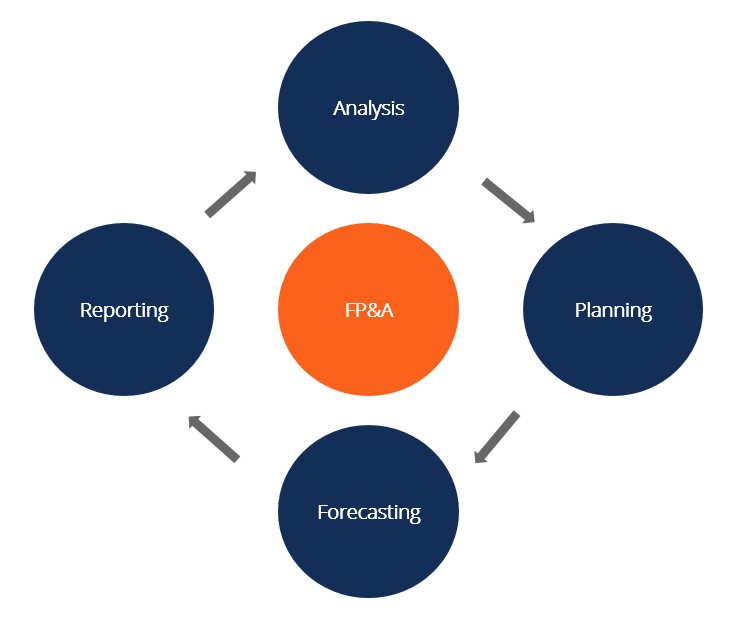Financial Planning & Analysis (FP&A) plays a vital role in guiding organizations towards financial success. FP&A teams are at the heart of strategic decision-making, influencing the direction of the company with their budgeting, forecasting, and insightful analysis. These analyses directly support the CFO, CEO, and the Board of Directors, ensuring they have the information they need to make informed decisions.
Very few businesses achieve sustained profitability and growth without a dedicated focus on financial planning and efficient cash flow management. Managing a corporation’s cash flow is a critical responsibility that generally resides with the FP&A team and the Chief Financial Officer (CFO). Understanding the dynamics between these roles is crucial.
 Role of FP&A in Corporate Finance
Role of FP&A in Corporate Finance
Corporate financial planning and financial analysts conduct detailed quantitative and qualitative assessments of all aspects of a business. This multifaceted approach helps evaluate the company’s progress toward its objectives and enables the creation of future plans and goals. FP&A Analysts thoroughly examine economic and business trends, review historical company performance, and proactively anticipate potential challenges and obstacles. All of this is done with the ultimate goal of creating accurate forecasts of a company’s future financial performance.
FP&A professionals are responsible for monitoring a wide array of financial activities, including income, expenses, taxes, capital expenditures, investments, and the integrity of financial statements. Unlike accountants, who primarily focus on record-keeping, financial analysts are tasked with examining, analyzing, and evaluating a company’s financial activities, and charting its financial future.
Is a Career in FP&A Right for You?
Successful financial analysts possess the ability to expertly handle and analyze vast quantities of data, using a wide range of data evaluation metrics. They are adept problem solvers, capable of deciphering intricate financial puzzles and envisioning various growth scenarios.
If you dislike mathematics or working with spreadsheet programs like Excel, then a career in finance may not be the correct path for you. However, if you enjoy creative problem-solving and have a talent for financial analysis, modeling, and forecasting, then a career as a corporate financial analyst could be the perfect fit.
Salary Expectations for FP&A Professionals
Those who excel in corporate finance, accurately predicting financial trends and recommending strategic financial decisions in a dynamic marketplace, are rewarded handsomely for their expertise. Entry-level junior analysts may earn annual salaries beginning around $50,000. Experienced senior analysts can earn up to $100,000, often with additional bonuses ranging from 10-15%. Financial planning and analysis managers and directors, as well as Chief Financial Officers (CFOs) at major multinational corporations, can earn salaries in the six- to seven-figure range, supplemented by substantial performance-based bonuses.
Compensation in the field varies significantly across industries and companies. Larger, more profitable companies are typically able to offer more competitive compensation packages than smaller companies. Bonuses are often dependent on company profitability and the analyst’s accuracy in financial forecasting.
Job growth in corporate finance positions is projected to be significant, with annual increases potentially exceeding 20% through the mid-2020s.
Essential Skills for Success in FP&A
Financial analysts must evaluate complex financial options and scenarios, and be able to make definitive decisions without becoming paralyzed by the overwhelming range of choices.
Continuous learning is vital for financial analysts. As businesses, markets, and economies evolve, analysts must also adapt. They must stay informed about business, industry, and economic trends. The best analysts are continuously expanding their knowledge and refining their skills.
Analyzing Financial Statements
Corporate financial planning and analysis professionals must be able to thoroughly understand a company’s financial statements, including balance sheets, cash flow statements, income statements, and, for public companies, shareholders’ equity statements.
A proficient analyst not only understands the meaning and implications of each individual financial statement, but can also understand how these components combine to reflect a company’s overall financial health through assets, liabilities, cash flow, and income.
A company’s financial analysis department should have a strong understanding of accounting journal entries and financial reconciliation statements. Analysts need a solid grasp of debits and credits and the ability to calculate and assess key financial ratios to accurately determine a company’s financial position and formulate strategic recommendations.
The Importance of Project Management Skills
Financial analysts are also financial planners, who advise a company’s management on strategies to grow the business and increase profits based on research, data collection, and analysis.
Financial analysts, in preparing reports such as three-year and five-year financial projections, are creating financial projects. As a result, effective financial analysts possess strong project management skills, including leadership, cost and time management, delegation, communication, and problem-solving abilities.
Most financial analysts have skills in using programs like Microsoft Excel to create and analyze reports. Corporate financial analysis requires significant data collection and consolidation, and the creation of reports with numerous variables.
Financial analysts spend significant time examining key financial metrics, like profit margins, sales volume, and inventory turnover, and using these insights to develop financial plans that drive the company toward increased profitability.
Education and Certifications for Corporate Financial Analysts
Aspiring corporate financial analysts can pursue various educational paths to achieve success in the field. Common degrees include accounting, business administration, statistics, and finance. A logical post-graduate path for financial analysts is an MBA degree.
Professional FP&A courses, along with continuing education training, are also available online. Certifications can improve job prospects, promotions, and earning potential.
Some corporate financial analysts also seek professional certification in investing, such as Certified Financial Planner (CFP), Financial Risk Manager (FRM), or Financial Modeling and Valuation Analyst (FMVA).
Valuable Work Experience for Financial Analysts
The most valuable practical experience, aside from direct financial analysis roles, is anything that demonstrates the ability to contribute to a company’s growth, particularly in a cost-effective manner. This could involve activities like increasing sales through effective merchandising or reducing overhead through improved inventory management.
General business experience that demonstrates problem-solving skills and the ability to increase profitability can enhance a resume when applying for corporate financial analyst positions.
Working at a bank or at a public accounting firm can also be an effective way to transition into FP&A.
FP&A’s Role in Corporate Structure
In smaller businesses, the role of a corporate financial analyst might be handled by the owner, CEO, CFO, or company controller. Larger companies have dedicated corporate financial analysis departments, led by a Director of Financial Planning and Analysis or the company’s Chief Financial Officer (CFO). Some companies have both positions, with the Director of Financial Analysis reporting to the CFO.
In large financial analysis departments, entry-level junior financial analysts typically work in small teams led by a senior financial analyst. At the largest multinational firms, junior analysts might be assigned to assess a single product line or product.
| CFO or Director of FP&A | Major Strategic Financial Planning | $700k plus bonuses |
|---|---|---|
| Senior Analyst or Manager | Project Management; Analysis | $100k plus bonuses |
| Junior Analyst | Specific Product(s), Department or Project Review | $60-70k (possible bonus) |
It takes about three to five years to progress from a junior to a senior financial analyst. Along the way, there may be opportunities to demonstrate skills and take on the title of manager, overseeing a specific financial project.
Specializations in Financial Analysis
Corporate financial analysts have a variety of specializations available to them. Some may focus on company investments, while others dedicate their skills to securing funding for growth initiatives.
Consider your preferred role and environment when exploring financial analyst job opportunities. Some may find fulfillment in a large corporation with established career paths, while others may thrive in the challenges of a smaller company undergoing rapid growth.
The growing focus on financial regulatory matters is a significant industry change. Regulations require financial personnel to allocate more time and effort to meeting regulatory obligations, which has made expertise in dealing with governmental regulations a valuable skill.
Career Paths After FP&A
Experienced corporate financial analysts often seek new challenges (and higher salaries) by transitioning to other companies.
Approximately 10% of corporate financial analysts transition into investment banking or private equity. Another 10% move into other areas of corporate management, such as sales and marketing or human resources.
Approximately 20% of financial analysts become private business consultants.
FP&A: A Vital Role with Significant Opportunities
Corporate financial analysis encompasses a broad range of activities and is essential to a company’s growth and financial health. A career in corporate financial planning and analysis (FP&A) provides various opportunities and above-average compensation. A suitable skill set and an aptitude for the work can lead to a rewarding career as a corporate financial analyst.
Corporate FP&A is important for supporting decisions made by a company’s CEO, CFO, and executive leadership team. As such, the opportunity to add value in FP&A is huge, and having a good time in place can lead to a huge potential boost in cash business planning, including budgeting, forecasting, cash flow optimization, return on investment analysis, capital structure, and ultimately the value of the entire business.
